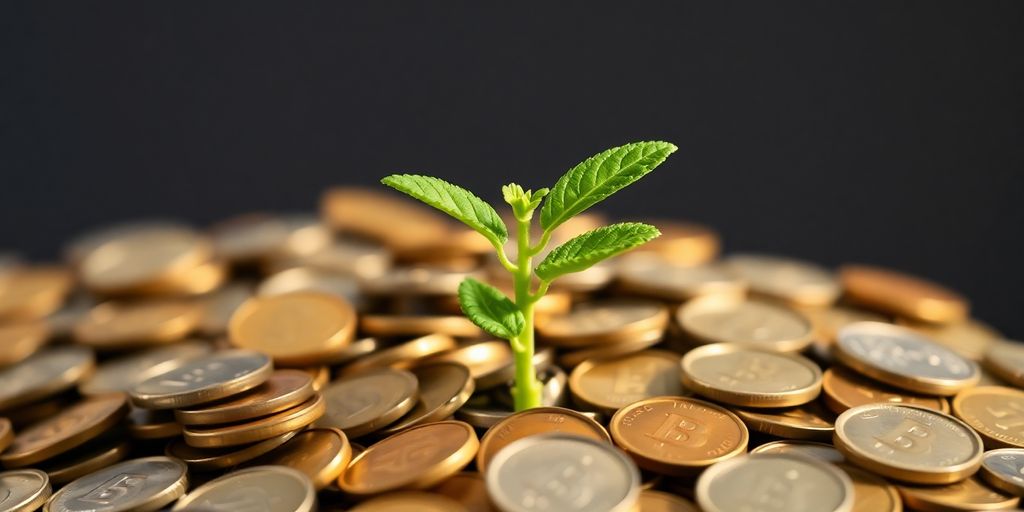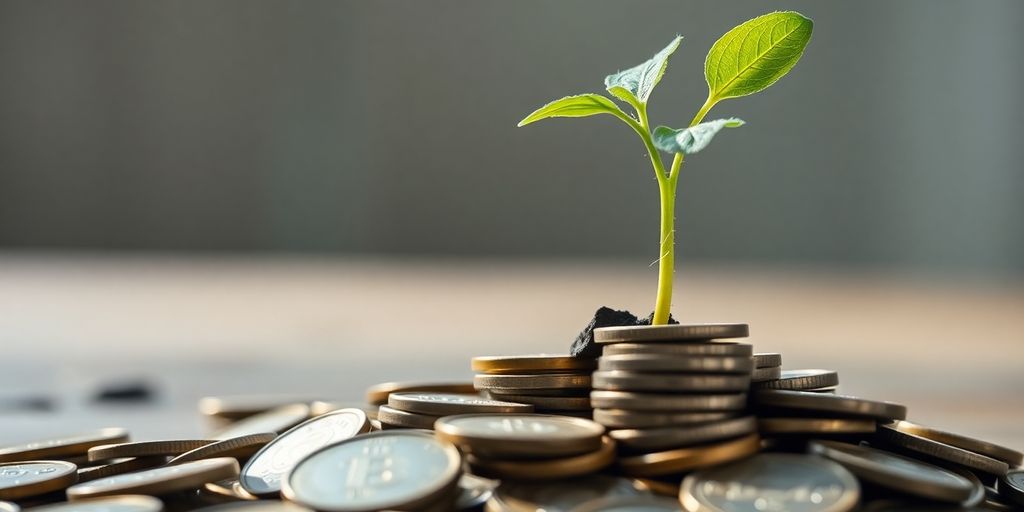
The Power of Compound Interest: Your Key to Early Financial Freedom
Ever wonder why everyone keeps saying to start saving early? It's not just some random advice. It's all about using time to your advantage with compound interest. This concept is like your money's best friend, especially when planning for the future. The earlier you start, the more your money can grow, turning even small savings into a hefty amount over time. Let's dive into why compound interest is such a big deal and how it can help you reach financial freedom sooner than you think.
Key Takeaways
- Compound interest is like earning interest on your interest, making your money grow faster over time.
- Starting early with investments can significantly increase your wealth due to the power of compounding.
- Even small, regular contributions can add up to a significant amount thanks to compound interest.
- Reinvesting dividends and interest can further boost your investment growth.
- Compound interest isn't just for the wealthy; anyone can benefit by starting early and being consistent.
Understanding the Basics of Compound Interest

What is Compound Interest?
Compound interest is a financial concept where you earn interest on both the initial amount of money you invested or saved, and on the interest that accumulates over time. This means your money grows at an increasing rate, making it a powerful tool for building wealth. Unlike simple interest, which only earns interest on the original amount, compound interest allows for exponential growth. Imagine your money working for you, not just once, but continuously, as it builds upon itself.
How Compound Interest Differs from Simple Interest
It's crucial to grasp the difference between simple and compound interest. Simple interest is calculated solely on the principal amount. For example, if you invest $1,000 at a 5% simple interest rate, you earn $50 each year. Compound interest, on the other hand, is calculated on the principal plus any previously earned interest. So, if you start with $1,000 at a 5% compound interest rate, you earn $50 in the first year, but in the second year, you earn interest on $1,050. This compounding effect leads to faster and greater growth over time.
The Mathematics Behind Compound Interest
The formula for calculating compound interest is: A = P (1 + r)^t. In this equation:
- A is the final amount of money accumulated after n years, including interest.
- P is the principal amount (the initial amount of money).
- r is the annual interest rate (decimal).
- t is the time the money is invested for, in years.
To illustrate, if you invest $1,000 at an annual interest rate of 5%, compounded yearly, after one year you will have $1,050. In the second year, you will earn interest on $1,050, not just the original $1,000. This snowball effect is the essence of compound interest.
Understanding compound interest is like planting a tree. Initially, growth is slow, but over time, with patience, it flourishes beyond expectations.
Using the concept of compound interest is essential for maximizing returns on investments like savings accounts and certificates of deposit. By reinvesting your earnings, you can significantly enhance the growth of your initial investment.
The Benefits of Starting Early with Compound Interest
Why Time is Your Best Friend
Starting early with compound interest is like planting a tree. At first, you might not notice much happening, but over time, the growth becomes undeniable. The earlier you start, the more time your money has to grow and multiply. It's not just about saving more; it's about letting your money work for you over decades. Time is the most powerful ally you have when it comes to building wealth.
The Impact of Early Investments
When you invest early, even small contributions can snowball into substantial sums. Imagine investing $200 a month at a 5% annual return. After 30 years, you'd have over $160,000. If you started just 10 years later, you’d end up with less than half of that amount. The earlier you start, the less you need to contribute to reach the same goal.
Case Studies: Early Starters vs. Late Bloomers
Consider two individuals: Alex and Jamie. Alex starts investing $100 a month at age 25, while Jamie starts the same amount at 35. By the time they both reach 65, Alex has accumulated nearly double what Jamie has, all because of those extra 10 years of compounding. It's a clear demonstration of how starting early can make a significant difference in your financial future.
Starting early doesn't require a huge initial investment. It's about consistency and letting time do the heavy lifting. Don't wait for the perfect moment; the best time to start is now.
Strategies to Maximize Your Compound Interest
Reinvesting Dividends and Interest
One of the easiest ways to boost your compound interest is by reinvesting dividends and interest. Instead of cashing out your earnings, let them stay in the account and grow. This way, your earnings will start earning their own earnings. It's like a snowball effect—small at first, but it picks up speed and size over time.
Choosing the Right Investment Accounts
Picking the right investment accounts is key. Tax-advantaged accounts like Roth IRAs, 401(k)s, or HSAs are great because they let your investments grow without being nibbled away by taxes. Choosing wisely can make a big difference in how much you end up with.
The Role of Consistency in Investing
Consistency is your best friend when it comes to investing. Regular contributions, even if they're small, help you build a habit and keep your investment growing. It’s like planting seeds regularly; over time, you'll have a forest.
Patience and regularity in investing are not just virtues—they're necessities. Keep at it, and the magic of compounding will work in your favor.
Common Misconceptions About Compound Interest
Myth: You Need a Large Initial Investment
A lot of folks think you need a big chunk of change to start benefiting from compound interest. Not true! Even small amounts can grow significantly over time. Think of it like planting a seed. You don't need a giant tree to start; just a little seed can eventually turn into something huge with time and patience.
Myth: Compound Interest is Only for the Wealthy
Some people believe compound interest is a tool only the rich can use. But here's the thing: anyone can harness its power. Whether you're putting away a few dollars a week or a few hundred, compound interest works the same way. It's all about consistency and letting your money sit and grow.
Myth: It's Too Late to Start Investing
Many think if they didn't start investing in their 20s, they've missed the boat. But starting late is better than never starting at all. Sure, starting early has its perks, but even if you're in your 40s or 50s, compound interest can still make a difference. The key is to start now and keep at it.
"It's never too late to start planting the seeds of your financial future. Even if you begin today, compound interest can help your money grow."
Real-World Examples of Compound Interest in Action

Savings Accounts and Retirement Funds
Compound interest plays a significant role in growing your savings and retirement funds. When you deposit money into a savings account, the interest earned is added to your balance, and in the next cycle, you earn interest on the new, larger amount. This "interest on interest" effect can significantly boost your savings over time. Similarly, retirement accounts like 401(k) and IRAs benefit from compound interest, making them powerful tools for long-term wealth accumulation. By starting early and contributing consistently, you can watch your retirement savings grow exponentially.
The Double-Edged Sword of Debt
While compound interest can help grow your savings, it can also increase your debt if not managed properly. Credit card balances are a prime example where compound interest can work against you. If you carry a balance and only make the minimum payments, the interest compounds on the remaining balance, leading to a growing debt burden. It's essential to understand this aspect of compound interest to avoid falling into a debt trap.
Long-Term vs. Short-Term Investment Outcomes
Investing for the long term can significantly leverage the power of compound interest. A long-term investment horizon allows the compounding effect to work its magic, turning small, regular contributions into substantial wealth. In contrast, short-term investments may not fully harness the benefits of compounding, as the time frame is too short for the interest to accumulate significantly. Therefore, for those seeking to build wealth through investments, a long-term strategy is often more beneficial.
Achieving Financial Freedom Through Compound Interest
Setting Realistic Financial Goals
To reach financial freedom, start by setting goals that are practical and achievable. It’s not about dreaming of millions overnight but rather about setting a clear path for your financial journey. Begin by assessing your current financial situation and determine what you need to save or invest monthly to reach your desired future. Create a budget that prioritizes your goals and stick to it. Consistency is key in building wealth through compound interest.
The Importance of Patience and Persistence
Compound interest is a long game. It rewards those who are patient and persistent. You might not see significant growth initially, but over time, the magic of compounding will become evident. Consider it like planting a seed; with time and care, it will grow into a flourishing tree. Keep investing regularly, and don't be swayed by short-term market fluctuations.
How Compound Interest Can Lead to Early Retirement
With the right strategies, compound interest can be your ticket to retiring earlier than expected. By starting early and contributing consistently, your investments will grow exponentially over time. This means that even modest monthly investments can accumulate to a substantial retirement fund. Imagine retiring a decade earlier simply because you took advantage of compound interest early on.
Financial freedom isn't just about having a lot of money; it's about having enough to feel secure and live comfortably without financial stress. By harnessing the power of compound interest, you can build a future where money works for you, not the other way around.
Consider exploring top options for compound interest investments like certificates of deposit, high-yield savings accounts, and bonds. These tools can help you maximize your returns and achieve your financial goals faster.
Conclusion
So, there you have it. Compound interest is like that friend who always has your back, quietly working behind the scenes to make sure you’re set for the future. It’s not about having a ton of money to start with; it’s about starting, period. The earlier you get going, the more time your money has to do its thing, growing and growing. Sure, it takes patience, but the payoff is worth it. Whether you’re putting away a little or a lot, the key is consistency. Keep at it, and over time, you’ll see your savings transform into something substantial. Remember, every dollar you invest today is a step closer to financial freedom tomorrow. So why wait? Start now and let compound interest work its magic.
Frequently Asked Questions
What exactly is compound interest?
Compound interest is like a snowball effect for your money. You earn interest not only on what you initially save but also on the interest that builds up over time. This means your savings grow faster and faster.
How is compound interest different from simple interest?
Simple interest is calculated only on the original amount you put in. Compound interest, on the other hand, is calculated on both your initial amount and the interest that has already been added. This makes your money grow more quickly.
Why is it important to start investing early?
Starting early gives your money more time to grow. Even small amounts can turn into a lot over many years because compound interest builds on itself, making your savings grow faster.
Do I need a lot of money to start investing with compound interest?
No, you don't need a lot of money to start. The key is to be consistent and patient. Even small regular investments can add up to a big amount over time thanks to compound interest.
Can compound interest help me retire sooner?
Yes! By starting to save and invest early, you give compound interest more time to work, which can help you build a bigger nest egg and potentially retire earlier.
Is compound interest risk-free?
While the idea of compounding is safe, the investments you choose to put your money in might have risks. It's important to choose wisely based on your comfort level with risk.